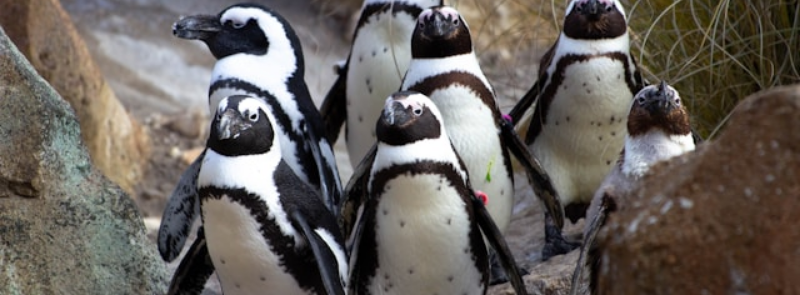
When It Occurs
Annually Second Saturday of October
Timeline
Days Passed (4)
# Hashtags
#InternationalAfricanPenguinAwarenessDay #AfricanPenguins
Get ready to commemorate International African Penguin Awareness Day on the second Saturday of October! This occasion is dedicated to shedding light on the African penguin, an endangered species inhabiting the coastal waters of southern Africa. Once abundant in the region, the African penguin has faced a significant decline in population due to various factors. This day presents a valuable opportunity for us to expand our knowledge about these majestic birds and explore ways to contribute to their preservation and prevent extinction.
History and Background
- Initiative: The day was established by SANCCOB (Southern African Foundation for the Conservation of Coastal Birds), a leading seabird conservation organization based in South Africa.
- Objective: It seeks to educate the public about the plight of African penguins, their habitat loss, threats they face, and conservation efforts to ensure their survival.
Objectives and Significance
- Conservation Awareness: Raise awareness about the conservation status of African penguins and the importance of preserving their habitats.
- Education: Educate the public, particularly local communities and youth, about the ecological role of African penguins and marine biodiversity.
- Advocacy: Advocate for policies and initiatives that support the protection and recovery of African penguin populations.
Themes and Focus Areas
- Species Conservation: Highlight efforts to conserve African penguins, including habitat restoration, breeding programs, and research initiatives.
- Threats to Penguins: Address the main threats to African penguins, such as overfishing, climate change, pollution, habitat destruction, and predation by invasive species.
- Community Engagement: Engage local communities, schools, and stakeholders in conservation activities and awareness campaigns.
- Global Action: Encourage global collaboration and support for marine conservation efforts that benefit African penguins and other seabird species.
Activities and Campaigns
- Awareness Campaigns: Organize educational events, workshops, beach cleanups, and public lectures to raise awareness about African penguins and marine conservation.
- Public Engagement: Host virtual events, social media campaigns, and interactive activities to engage people globally in learning about and supporting African penguin conservation.
- Field Trips: Conduct guided tours and field trips to penguin colonies and rehabilitation centers to observe penguins in their natural habitats and learn about conservation efforts firsthand.
- Fundraising: Raise funds for conservation projects, research, and rehabilitation efforts aimed at protecting African penguins and their habitats.
How to Participate
- Learn About Penguins: Educate yourself about African penguins, their behavior, habitat, and the conservation challenges they face.
- Support Conservation Efforts: Donate to organizations like SANCCOB and other wildlife conservation groups that work to protect African penguins and their habitats.
- Spread Awareness: Share information about International African Penguin Awareness Day on social media, participate in local events, and encourage others to get involved in penguin conservation.
- Reduce Environmental Impact: Take actions to reduce your carbon footprint, minimize plastic use, and support sustainable fishing practices to help protect marine ecosystems.
Global Participation
- International Observance: International African Penguin Awareness Day is observed globally by conservation organizations, zoos, aquariums, educational institutions, and individuals passionate about wildlife conservation.
- Collaborative Efforts: Collaborate with international partners, researchers, and governments to implement conservation strategies and policies that benefit African penguins and marine biodiversity.
- Public Outreach: Engage the public through multimedia campaigns, online resources, and community outreach programs to raise awareness and promote conservation action.
Resources and Support
- SANCCOB: Provides resources, educational materials, and opportunities for public involvement in African penguin conservation efforts.
- Conservation Organizations: Offers information, research updates, and volunteer opportunities for individuals interested in supporting African penguin conservation.
- Educational Materials: Access educational resources, lesson plans, and interactive tools for teaching about African penguins and marine conservation in schools and communities.
Notable Observations and Examples
- Success Stories: Highlights successful conservation projects, breeding programs, and rehabilitation efforts that have contributed to the recovery of African penguin populations.
- Community Impact: Showcases community-led initiatives and partnerships that have raised awareness and mobilized support for African penguin conservation locally and globally.
- Research Advancements: Shares scientific research and monitoring efforts aimed at understanding African penguin behavior, ecology, and population dynamics to inform conservation strategies.
Key Messages
- Conservation Urgency: Emphasize the urgent need to protect African penguins and their habitats from threats such as habitat loss, climate change, and overfishing.
- Community Engagement: Encourage individuals, communities, and stakeholders to take action and support conservation initiatives that benefit African penguins and marine biodiversity.
- Global Responsibility: Promote global responsibility and collaboration in safeguarding marine ecosystems and wildlife for future generations.
International African Penguin Awareness Day serves as a reminder of the importance of conserving endangered species like African penguins and taking collective action to protect our oceans and marine biodiversity. It encourages individuals and organizations worldwide to contribute to the preservation of these iconic seabirds and their habitats.


